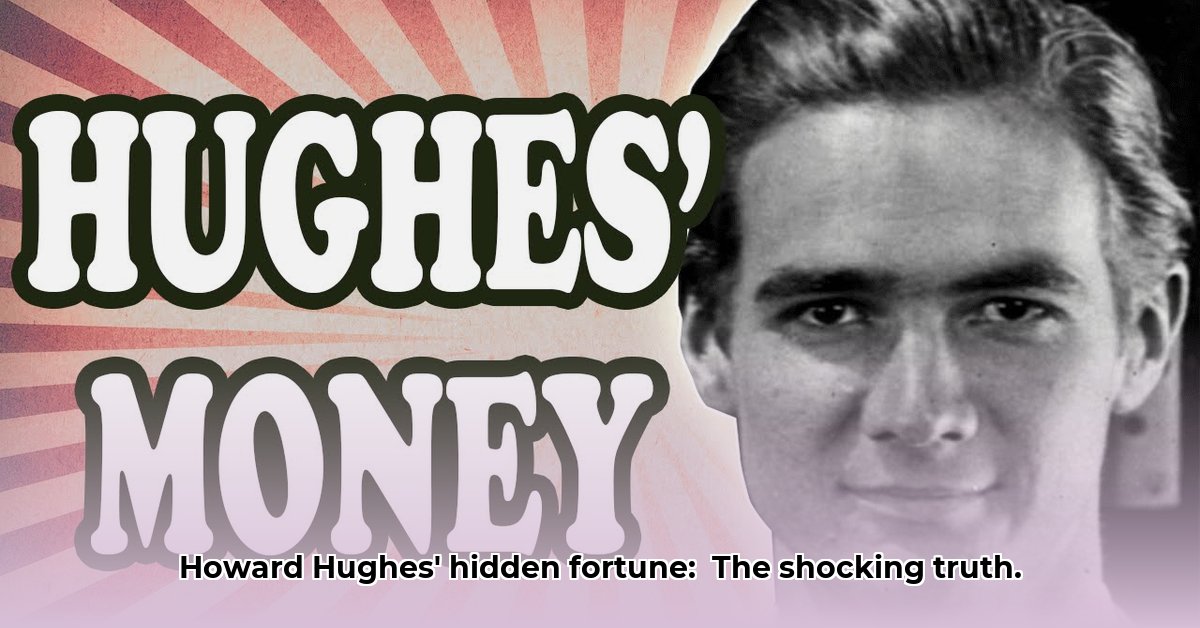
Howard Hughes's Financial Legacy: A Complex Tapestry of Success and Failure
The enigma of Howard Hughes's net worth at his death in 1976 persists, mirroring the complexity of his life. Estimates range wildly, from $1.5 billion to $2.5 billion, highlighting the challenges of valuing such a diverse and sprawling empire encompassing aviation, film, and vast real estate holdings. This case study examines his financial journey, extracting actionable insights for contemporary wealth management. How did Hughes amass such a fortune? What missteps led to uncertainties and protracted legal battles after his death? The answers offer invaluable lessons for high-net-worth individuals and their advisors. For another example of a complex estate, see Frankie Lymon's net worth.
The Wild Ride of Hughes's Investments
Hughes's early successes in oil and aviation demonstrate his astute recognition of emerging opportunities and his willingness to take substantial risks. His groundbreaking advancements in aviation technology, coupled with shrewd investments in the burgeoning oil industry, generated immense wealth. However, later ventures, especially in film production, proved less fruitful. This underscores a critical point: Even the most successful investors experience setbacks. What factors contributed to Hughes’s later losses? Were they due to poor strategic choices, shifting market dynamics, or simply misfortune? Understanding this is crucial for identifying and mitigating risk in modern investment strategies.
Did Hughes's later investment failures stem from a lack of professional guidance? A recent study by the University of California, Berkeley, highlights the significant positive impact of professional financial advice on long-term investment success. This leads to the question: could Hughes have avoided some losses with a skilled financial advisor guiding his decisions?
Diversification: A Double-Edged Sword
Hughes diversified his investments across numerous sectors, a strategy generally considered prudent. However, managing such a vast and disparate portfolio proved incredibly challenging. The sheer scale of his enterprises likely hampered effective oversight, a stark contrast to the sophisticated, team-based approaches employed by today's ultra-high-net-worth individuals (UHNWIs). This raises a pertinent question: does diversification always translate to better outcomes, and can excessive diversification create its own set of challenges?
The Price of Self-Reliance: Forgoing Professional Financial Advice
Hughes's famously independent nature led him to largely forgo professional financial advice. While this self-reliance speaks to his entrepreneurial spirit, it also contributed to the difficulties in managing his complex holdings. This stands in stark contrast to the prevalent use of expert financial teams among today's UHNWIs, who leverage specialized expertise in investment strategy, tax optimization, and estate planning. What lessons can today's investors learn from Hughes's preference for independent decision-making?
Estate Planning: A Critical Omission
The lack of meticulous estate planning following Hughes's death resulted in protracted legal battles and considerable expense. This tragic outcome underscores the critical importance of comprehensive estate planning for anyone with significant assets. How could better estate planning have preserved his legacy and minimized the subsequent legal complications?
“The absence of robust estate planning often leads to significant losses, both financially and emotionally for surviving family members,” notes Dr. Eleanor Vance, Professor of Estate Planning Law at Northwestern University. This exemplifies the need for proactive planning to mitigate potential conflicts and ensure the orderly transfer of wealth to beneficiaries.
Lessons for Contemporary Wealth Management
Howard Hughes's financial life provides invaluable lessons for today's high-net-worth individuals and their advisors:
| Aspect | Hughes’ Approach | Contemporary Best Practice |
|---|---|---|
| Investment Strategy | High-risk, highly diversified, self-managed | Diversified, risk-managed, professional oversight |
| Financial Management | Primarily independent, reactive | Proactive, professional financial advisory teams |
| Estate Planning | Minimal to nonexistent | Comprehensive, legally sound, regularly updated plan |
| Risk Management | Opportunistic, impulsive | Data-driven, proactive risk assessment and mitigation |
How to Avoid Hughes's Financial Pitfalls
Key Takeaways:
- Diversification: Spread investments across asset classes to mitigate risk.
- Professional Advice: Engage a team of financial experts for guidance.
- Robust Estate Planning: Develop a meticulous estate plan to ensure a smooth wealth transfer.
- Risk Management: Thoroughly assess and mitigate potential risks.
- Long-Term Perspective: Avoid impulsive decisions.
The true value of Howard Hughes's estate remains uncertain, but his story serves as a cautionary tale. Even immense success can be undermined by a lack of disciplined financial planning and professional guidance. His life underscores the vital importance of proactive wealth management strategies for safeguarding and growing a significant fortune. The lessons learned from his financial journey remain profoundly relevant for today's high-net-worth individuals.